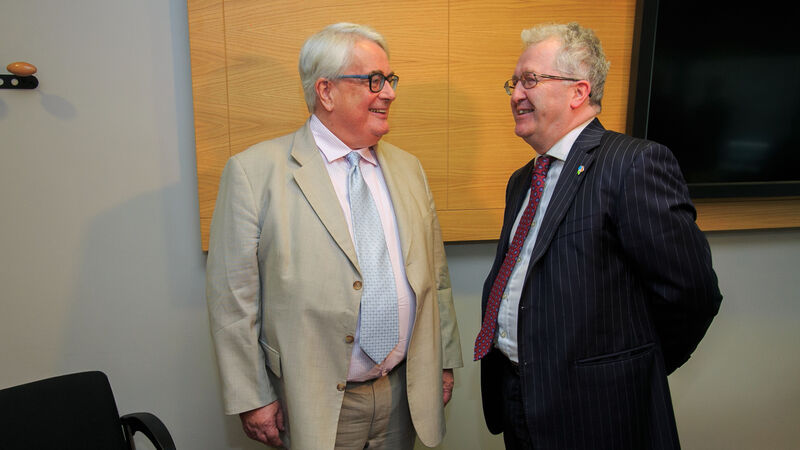Michael Clifford: No winners in the Woulfe debacle

File photograph of chief justice Frank Clarke and then attorney general Seamus Woulfe in 2018. Picture: Gareth Chaney Collins
The basics should be drummed into children at a very young age. When you do wrong, apologise, and mean it; be truly sorry and then you can move on.
The basics should be drummed into senior figures in public life, such as EU commissioners and Supreme Court judges.
If Phil Hogan had taken a different tack in the immediate aftermath of the now fabled golfing dinner in Clifden in August, he might still be in a job.
If the former attorney general had done likewise, his colleagues on the Supreme Court would not now think of him as the big, bad Woulfe.
The complete farrago around the future of Seamus Woulfe’s judicial career has its roots in his tone-deaf response to events in Clifden. The apology he issued in the immediate aftermath referenced how he “ended up in a situation where breaches may have occurred”.
How did he end up there? Was he kidnapped?
The big problem came later in the publication of his interview with former chief justice Susan Denham. It was tone-deaf.
However, if being tone-deaf to the public mood were a sacking — or resigning — offence, Leinster House and the Four Courts would be emptied in a matter of days.
The chief justice and all his colleagues on the Supreme Court believe that Judge Woulfe’s inability to comprehend the anger over Clifden renders him unfit to serve on the court.
Irrespective of where the matter goes from here, that alone could have serious implications for the future of monitoring judicial conduct.
Next July, the element of the Judicial Council Act 2019 dealing with complaints and misconduct comes into effect. This is a new body, feeling its way, with no precedent to rely on.
Will judges of the Supreme Court consider that they can ignore decisions of the council if those decisions are in conflict with their own evaluation of a particular situation?
Susan Denham conducted a non-statutory inquiry and came to conclusions.
She is widely respected as a lawyer of considerable ability.
Her conclusion, based on both the evidence and her interview with Seamus Woulfe, was that it was a yellow card offence. He should not be forced out the door.
The judges of the Supreme Court have effectively overruled her. They do not have confidence in him as a colleague because of how he dealt with Ms Denham’s inquiry.
So retaining the confidence of one’s peers in a scenario where a judge has not committed any wrongdoing is to be considered a matter requiring sanction.
This is where the bar might be set for the Judicial Council and it is a very low threshold.
What if during a recession, a judge publicly states that the judiciary should take a pay-cut, against the wishes of colleagues?
He or she may well lose their confidence. Is that to be deemed a transgression requiring sanction?
There is a danger in this Woulfe business that precedents will be set which might act to tie the hands of the Judicial Council.
Historically, in any other instance in which a judge’s resignation or removal was up for discussion, wrongdoing had been clearly identified. That’s not the case here.
While chief justice Frank Clarke and his colleagues are undoubtedly acting in good faith and in what they consider the best interests of the courts, there is one other issue that may inadvertently be informing their confidence deficit.
Seamus Woulfe was appointed directly to the Supreme Court from the cabinet.
It is very unlikely that such a route to the bench would have been open to him had he not served as attorney general. (The only direct appointee on the current Supreme Court is Donal O’Donnell, who was widely considered to possess unparalleled ability in the law).
Would the sitting judges be reacting in the same manner if one of their own number had turned out to be as tone-deaf as Seamus Woulfe?
One way or the other, any grounds for impeachment appear to be extremely flimsy.
Damage will continue to be done to the reputation of the courts while this continues.
Damage may also be done to the prospect of the judicial council having a clean slate from which to evaluate misconduct on the bench.
There are no winners here.





